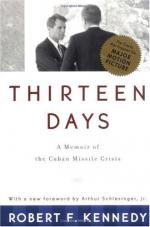
|
| Name: _________________________ | Period: ___________________ |
This test consists of 15 multiple choice questions and 5 short answer questions.
Multiple Choice Questions
1. How many destroyers did the U.S. put in Caribbean waters?
(a) 1.
(b) 25
(c) 5.
(d) 12.
2. Robert tells he once heard World War Three would be fought with atomic weapons. What then would the next war be fought with?
(a) Swords and cannons.
(b) Guns and knives.
(c) Atomic weapons.
(d) Sticks and stones.
3. What does Robert claim can "best be judged by conflict, by debate" (86)?
(a) Life.
(b) Business.
(c) Leaders.
(d) Opinion.
4. What "committed American ground forces to what has become the longest war in our history" (102)?
(a) The Bay of Pigs.
(b) The Cuban Missile Crisis.
(c) The invasion of Cambodia.
(d) The Tonkin Gulf Resolution.
5. What did Robert promise to do with his daughters on October 28th?
(a) Buy Halloween costumes.
(b) Attend the theater.
(c) Go to a Horse Show.
(d) Go shopping.
6. Why did JFK originally want to remove the missiles from Turkey?
(a) They were dangerous to world peace.
(b) He did not want to anger the Soviets.
(c) He wanted to invade Turkey.
(d) They were obsolete.
7. According to the Afterword, the Cuban Missile Crisis is important on how many levels?
(a) Five.
(b) Two.
(c) Three.
(d) Ten.
8. Who was Tommy Thompson?
(a) Secretary of State.
(b) Chief of Staff.
(c) Former Ambassador to the Soviet Union.
(d) Former Ambassador to Cuba.
9. What feeling does Robert believe Congress and the country is turning to but should not?
(a) Isolationism.
(b) Communism.
(c) Inclusion.
(d) Marxism.
10. Who wrote the letter responding to Khrushchev's first letter?
(a) The State Department.
(b) Robert and Sorensen.
(c) JFK and Robert.
(d) The Joint Chiefs of Staff.
11. Why does Khrushchev claim the Soviet Union has placed missiles in Cuba?
(a) To provoke the U.S. into war.
(b) To potect the Soviet people in Cuba.
(c) To prevent the U.S. from invading.
(d) To fire upon all major U.S. cities.
12. What is the crisis a microcosm for according to the authors of the Afterword?
(a) Problems of the modern American Presidency.
(b) Problems of the nuclear age.
(c) The inevitability of nuclear war.
(d) The workings of democracy.
13. What does the change in attitude from the letter received on the 26th and the letter received on the 27th suggest?
(a) Translation mistakes.
(b) Deception.
(c) Desire for war.
(d) Soviet confusion.
14. Who said, " You are in the courtroom of world opinion right now, and you can answer yes or no. You have denied that they exist, and I want to know whether or I have understood you correctly" (58)?
(a) Pierre Salinger.
(b) Adlai Stevenson.
(c) V. A. Zorin.
(d) Don Wilson.
15. Robert tells that JFK felt that if what had happened could be considered a triumph, it was only one for who?
(a) The Soviet Union.
(b) Cuba.
(c) The next generation.
(d) America.
Short Answer Questions
1. What countries were supporting the U.S. and recommending that the U.S. not give in to Soviet demands?
2. What does Robert believe had a "major psychological and practical effect on the Russians and changed our position . . . into a country acting in accordance with twenty allies legally protecting their position" (92)?
3. Whose job does Robert believe is getting bigger and is in actuality five jobs under one title?
4. Who said, "I am not in an American courtroom, sir, and therefore I do not wish to answer a question that is put to me in the fashion in which a prosecutor puts questions" (58)?
5. What animal does Khrushchev compare Russia and the U.S. to when he says they will be exterminated in the case of a war?
|
This section contains 579 words (approx. 2 pages at 300 words per page) |

|




